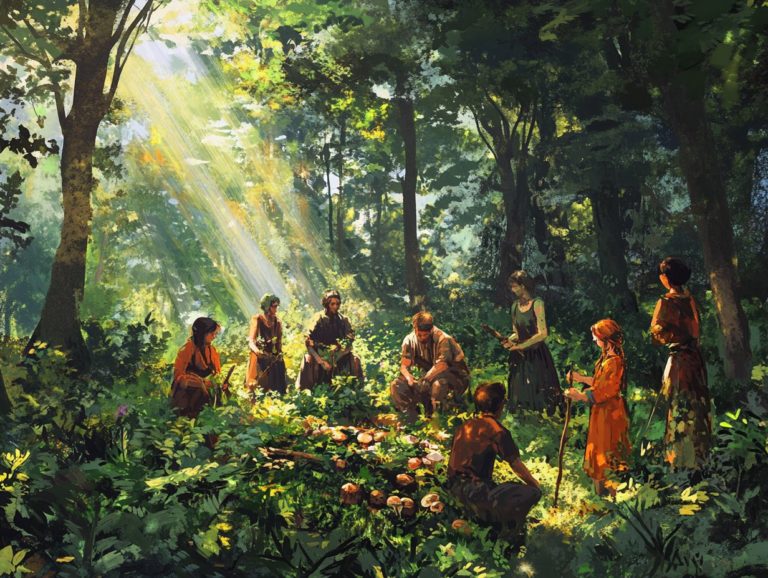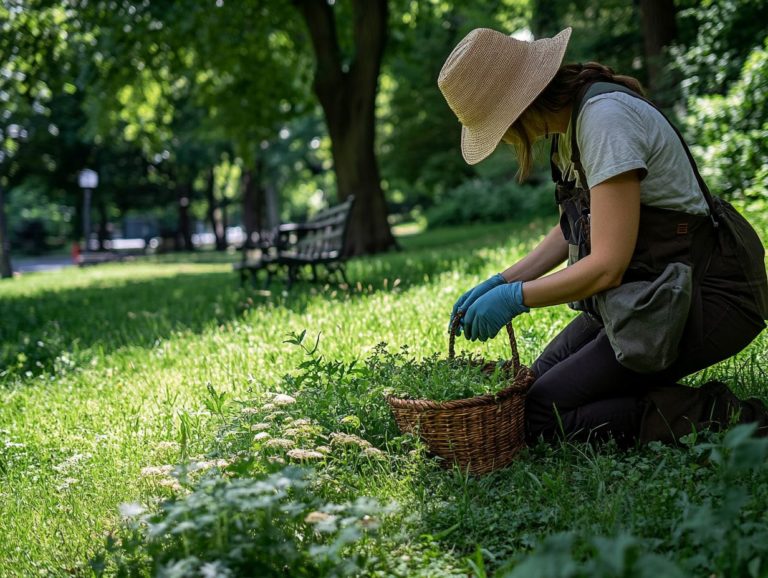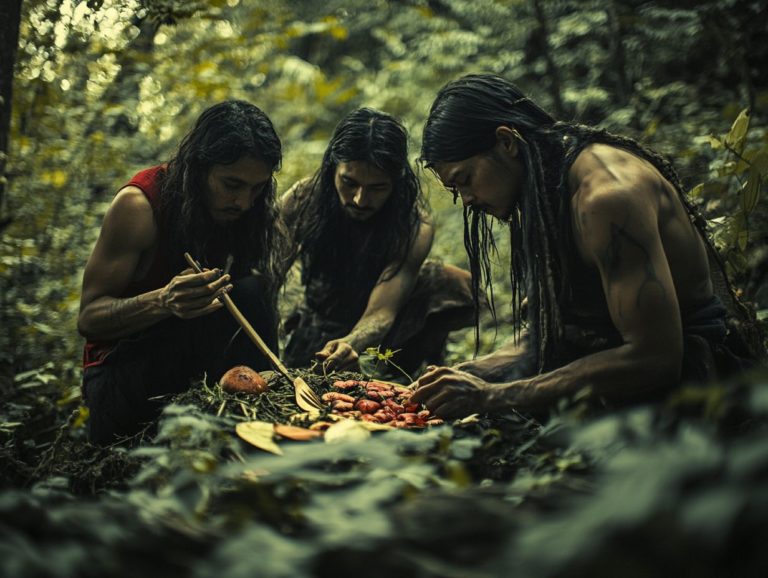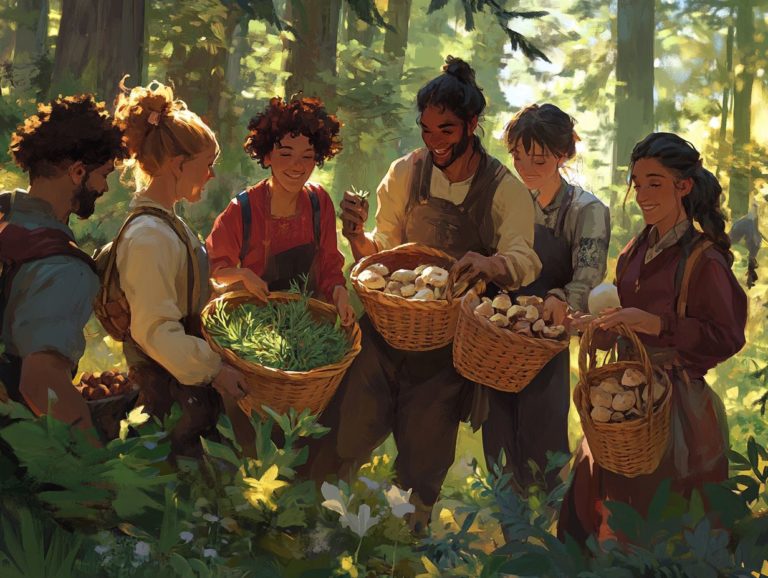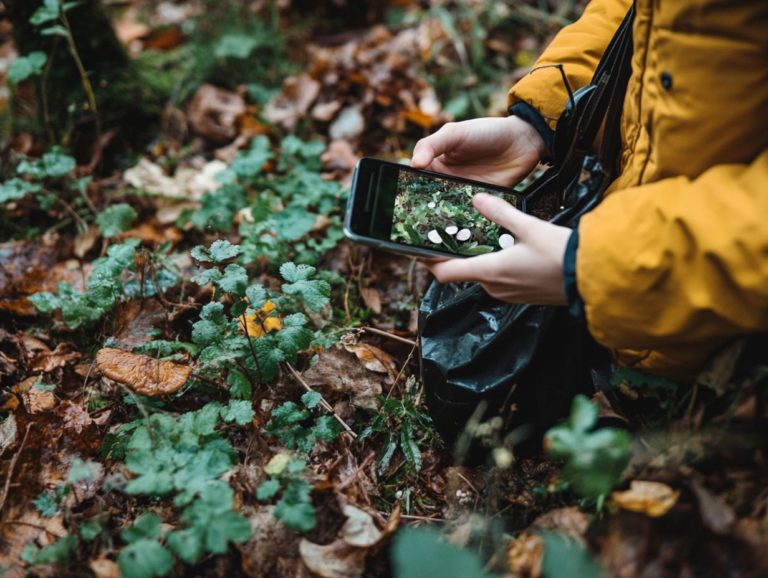How to Educate Others About Sustainable Foraging
Sustainable foraging transcends the realm of mere hobby; it stands as a crucial practice that not only helps preserve our natural ecosystems but also fosters a profound connection with the land.
This article delves into the importance of foraging responsibly and its positive impact on the environment. You’ll discover how to identify sustainable foraging practices, effectively educate others, and advocate for these values within your community.
By embracing this collective effort, you can cultivate a deeper appreciation for our natural resources and ensure their flourishing for generations to come.
Contents
Key Takeaways:
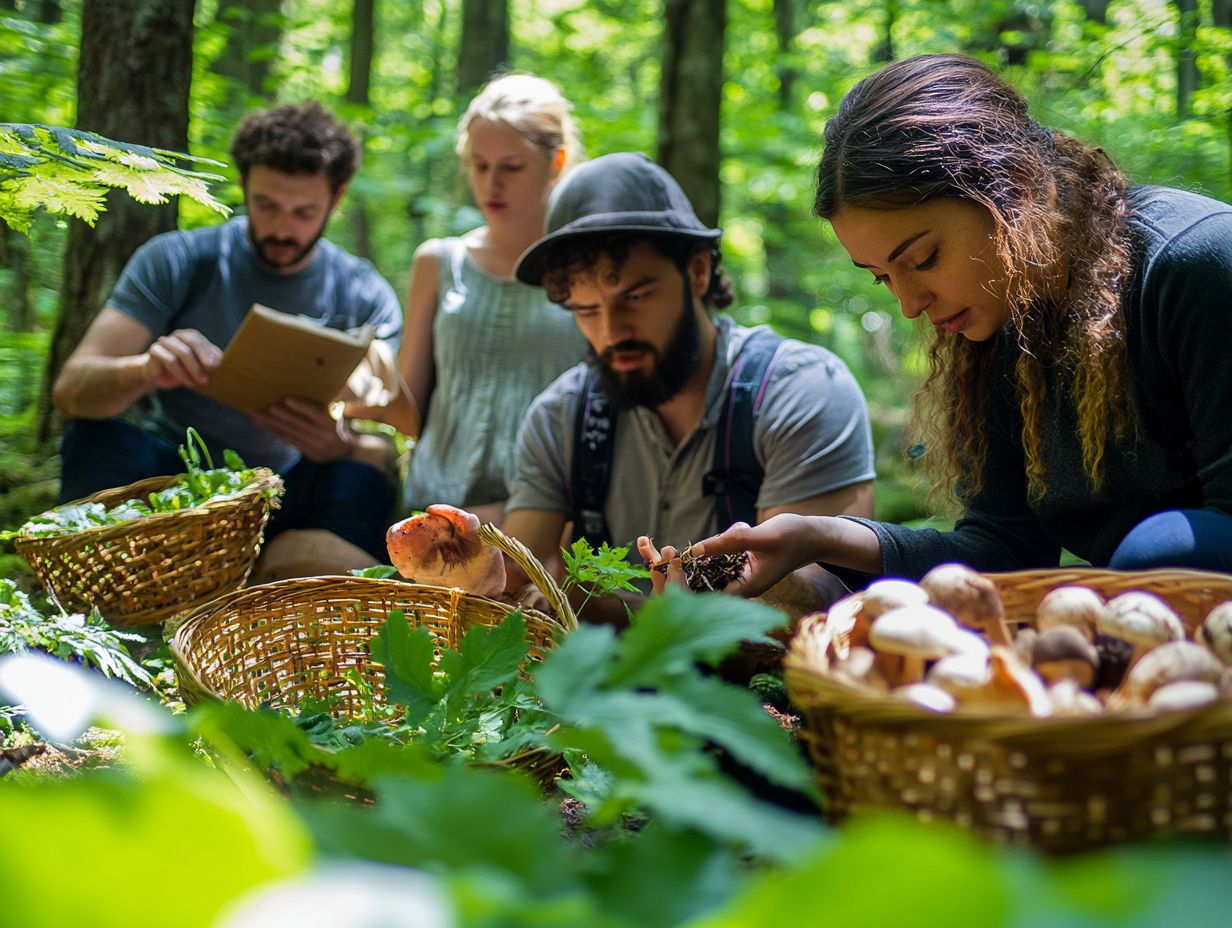
- Educating others about sustainable foraging is crucial for protecting the environment and preserving natural resources.
- Sustainable foraging practices involve considering the impact on the environment, using ethical harvesting methods, and promoting biodiversity.
- Effective communication, collaboration with local groups, and utilizing educational resources are key strategies for promoting sustainable foraging in the community.
The Importance of Sustainable Foraging
Sustainable foraging is an essential practice that champions environmental conservation. It also tackles food insecurity in urban areas and food deserts.
By responsibly harvesting edible plants, you help ensure a thriving environment for future generations.
Embracing Indigenous foodways in your foraging endeavors enhances ecological balance and honors the cultural significance of native plants. Understanding the principles of sustainable harvesting, along with utilizing top resources for sustainable foraging, is crucial for nurturing community support and ensuring that foraging remains a viable alternative to store-bought food in a world increasingly dominated by commercial agriculture.
Understanding the Impact of Foraging on the Environment
Foraging profoundly impacts the environment, acting as a bridge to nature while holding the potential to either harm or enhance ecosystems, depending on how you approach it.
When you engage in foraging thoughtfully, you can boost food sovereignty by enabling yourself and your community to tap into local resources often overlooked.
This practice promotes the sustainable harvesting of native plants think wild leeks or dandelions which, when gathered in moderation, allow ecosystems to flourish.
On the flip side, irresponsible foraging can lead to overharvesting, disrupting local flora and negatively affecting biodiversity. For example, if you take too many fiddlehead ferns, you risk diminishing the plant’s ability to regenerate, which can have a ripple effect on the wildlife that relies on it and the delicate balance of the ecosystem.
Therefore, grasping and implementing sustainable techniques is essential to ensure that foraging remains a rewarding activity that safeguards both natural habitats and local food systems.
Identifying Sustainable Foraging Practices
Identifying sustainable foraging practices demands a good understanding of ethical foraging techniques, adept plant identification skills, and a genuine respect for local ecosystems.
Each of these elements plays a vital role in nurturing the health of both our environment and our communities.
Criteria for Sustainable Foraging
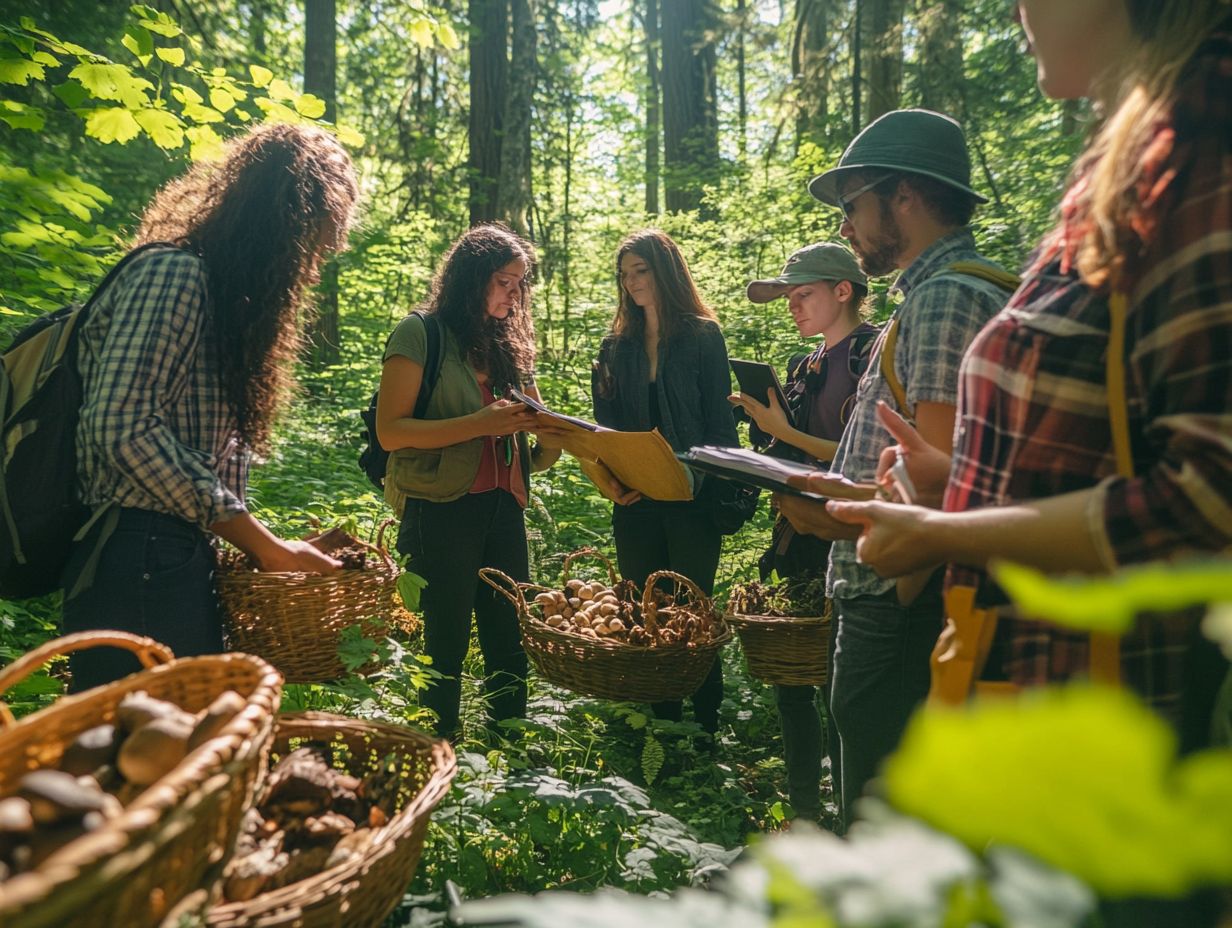
The criteria for sustainable foraging revolve around clear guidelines for harvesting that prioritize ecosystem health while fostering community engagement in sustainable practices.
These guidelines are vital for ensuring that wild food sources remain plentiful for future generations, inviting you to forge deeper connections with your local environment.
For instance, when you re out foraging for wild edibles like ramps or fiddleheads, it s essential to limit your harvest to a small percentage of any population, allowing those plants to regenerate.
Joining local foraging groups not only enhances your knowledge but also amplifies the collective efforts toward food sovereignty.
Community support can facilitate educational workshops on responsible foraging, teaching you how to use local resources for sustainable foraging, enabling you to make informed choices that honor nature and promote sustainability.
Join a local foraging group today to learn how you can make a difference!
How to Educate Others About Sustainable Foraging
Educating others about sustainable foraging helps people understand the importance of respecting nature and its resources, including how to use foraging to educate others.
Engaging thoughtfully can inspire a collective commitment to sustainability and cultivate a genuine reverence for the natural world.
Effective Communication Strategies
Implement effective communication strategies, like visual aids and storytelling, to elevate your learning experience in sustainable foraging.
Use vibrant visuals of edible plants. This makes it easier to spot what’s safe to forage and deepens your appreciation for nature s bounty.
Sharing stories that highlight the cultural significance of foraging practices fosters a sense of connection and community. These narratives enrich your educational journey and invite you to engage more profoundly with the traditions and knowledge passed down through generations.
Such techniques encourage meaningful dialogue and collaboration, deepening your connection to both the environment and like-minded individuals who share your passion for sustainable living.
Tools and Resources for Educating Others
Using the right tools and resources to educate others about sustainable foraging amplifies the impact and reach of your educational initiatives, including how to share your foraging knowledge.
Websites, Organizations, and Educational Materials
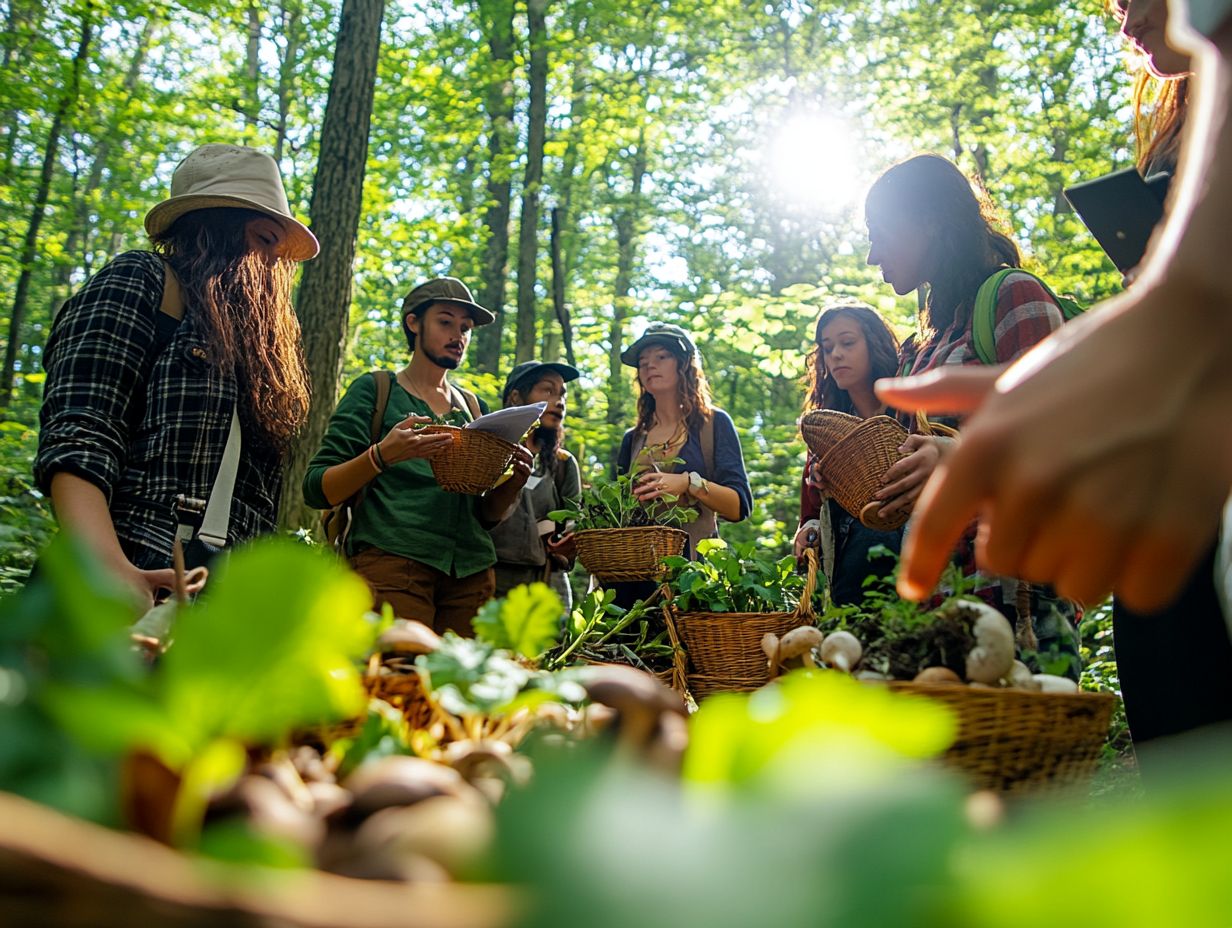
Many websites and organizations offer a treasure trove of educational materials for anyone eager to explore sustainable foraging practices, including how to share foraging knowledge with others.
These platforms provide detailed literature on local edible plants and mushrooms, along with workshops to enhance your practical skills. Getting involved in community support initiatives allows you to share personal experiences while appreciating nature s offerings.
Connect with seasoned foragers, broaden your understanding of local ecosystems, and develop responsible foraging habits by promoting ethical foraging in your community that honor both the environment and the community.
This collaboration among enthusiasts fosters sustainable practices, ensuring that future generations can enjoy the bounties of the wild.
Promoting Sustainable Foraging in the Community
Promoting sustainable foraging in the community involves collaborating with local groups and initiatives that create a culture of environmental awareness and food sovereignty.
Working with these organizations strengthens community ties and amplifies the message of responsible foraging, ensuring that both nature and culture thrive.
Collaborating with Local Groups and Initiatives
Collaborating with local groups is crucial for creating a supportive network that champions sustainable foraging and encourages community engagement.
By joining forces, these organizations can host joint foraging events that educate participants about edible plants while building camaraderie among community members.
For example, a recent partnership between a local environmental nonprofit and a community center resulted in workshops where residents learned to identify and sustainably harvest wild mushrooms.
This collaboration raised awareness about native flora and emphasized the importance of preserving local ecosystems. Sharing resources like databases of foraging locations or guides to seasonal plants enhances the educational experience, making it enjoyable and accessible for everyone involved.
Frequently Asked Questions
What is sustainable foraging?
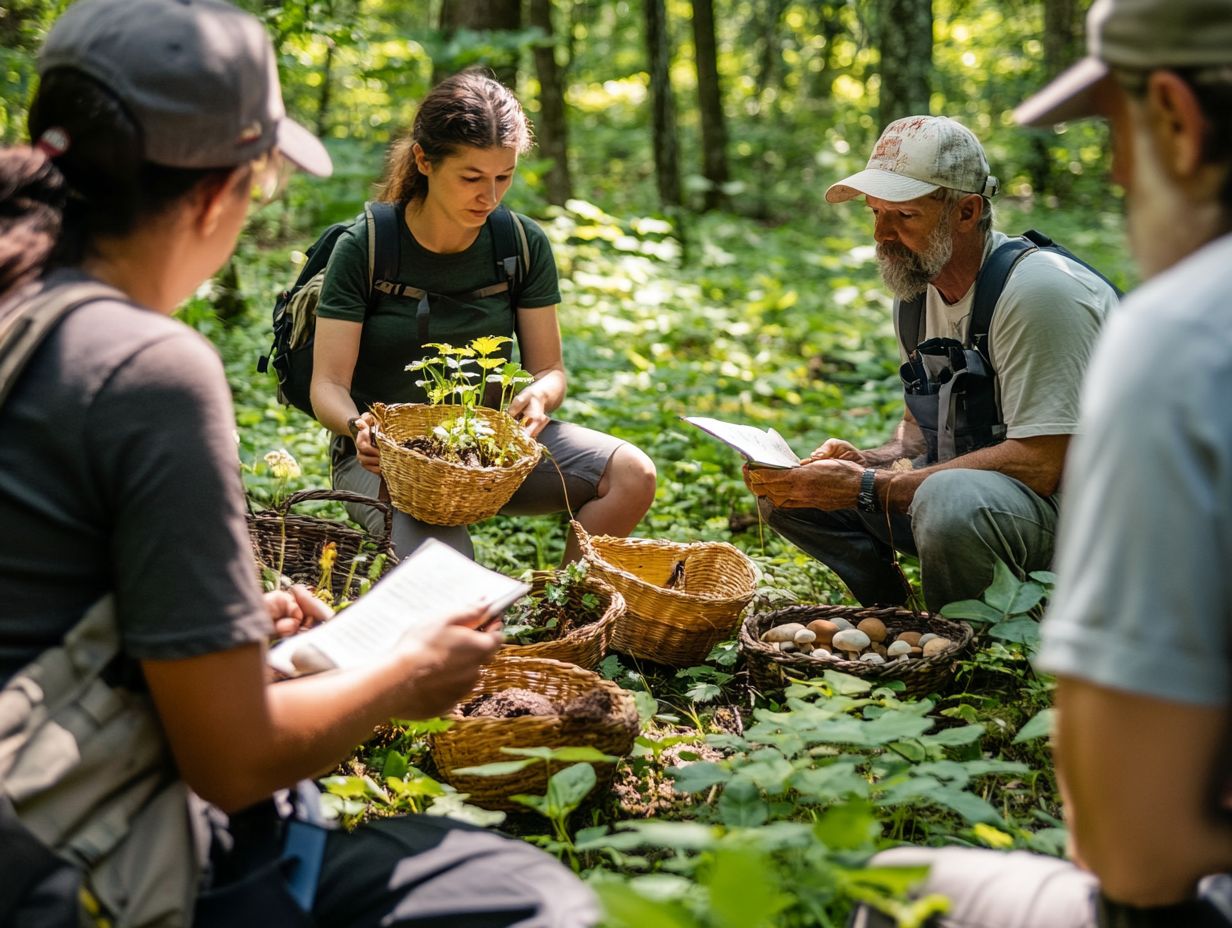
Sustainable foraging means gathering wild plants and mushrooms without harming the environment. This helps ensure these resources thrive for future generations.
Why educate others about sustainable foraging?
Teaching sustainable foraging promotes responsible practices, and spreading awareness on foraging techniques further protects wild resources and supports local ecosystems.
How can I educate others about sustainable foraging?
Host workshops, give presentations, or share on social media. You can also learn how to encourage others to try foraging by leading by example and practicing sustainable foraging yourself.
Key principles of sustainable foraging
Respect landowners, obtain permits, and harvest responsibly. Always leave enough resources for plants and animals to thrive.
Can foraging be harmful to the environment?
Foraging can harm the environment if done irresponsibly. Over-harvesting can damage ecosystems, so it’s vital to practice and teach sustainable methods.
Resources for learning more
Many resources are available, like books and workshops, to guide you in sustainable foraging. Consider connecting with local groups and organizations for support. Notable authors like Samuel Thayer and Alexis Nikole offer valuable insights into Indigenous foodways. Organizations such as NatureServe Explorer and the USDA Plants Database can enhance your understanding of edible plants and medicinal plants like stinging nettle and morel mushrooms.


